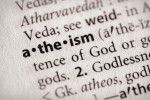The New Atheists are wrong about Christianity

September 22, 2016

September 11th, which we recently commemorated, helped to invigorate the “New Atheists,” a group of polemicists who bitterly criticize religion. Because the September 11th hijackers had religious motivations, the New Atheists claim, among other things, that religion is irrational and leads to violent tragedies like the one that transpired on that dreadful day. They generally focus their criticisms on the Abrahamic faiths, but Christianity is arguably their favorite target. Reflecting on Christendom’s past sins, such as the Crusades and the Inquisition, as well as relatively recent events like the Catholic Church sexual abuse scandals, men like the late Christopher Hitchens, Richard Dawkins and others have attacked the Christian faith as cruel, stupid and irrational. But worst of all, they claim that Christians’ misdeeds are the result of belief in a vengeful, hateful God.
Having converted to Catholicism as a ninth grader, I debated a number of atheists and agnostics back in high school. They didn’t always make claims that God must be evil because some Christians are, but they did occasionally. And each time they made some version of that argument, they were not persuasive. The argument that God and religion must be bad because religious believers have committed evil actions is fallacious. Much worse, it fails to grapple with Christian theology.
Take any example of an act of violence or hatred that Christians have committed. For example, the wars between Catholics and Protestants during the Reformation. Were Christians on both sides wrong for killing each other over theology? Of course they were. But those wars weren’t necessarily a reflection of Christian belief. In fact, they were quite the opposite. Jesus taught His disciples to “love one another as I have loved you” (John 15:12). Clearly, killing each other over differences in belief isn’t an act of love, so the Christians who participated in those wars erred in their ways.
To be fair, it’s actually because of Bible passages similar to that one that the New Atheist critique has some validity to it. Jesus also said, “This is how all will know that you are my disciples, if you have love for one another” (John 13:35). So maybe the New Atheists have a point: if you Christians don’t love one another, then your God must be awful since you are supposed to reflect Him in love, but you don’t. But Christians’ moral failings aren’t an indictment of God. Rather, they imply the need for moral standards, which are exactly what the Christian God Himself gives us. He is a God of love who doesn’t sanction gratuitous violence.
It’s because of human failures to live up to high standards that Christianity makes a lot of sense theologically. Christian theology begins with the doctrine of original sin. Original sin is the belief that all humans, because of the faults of their ancestors, are flawed, broken and in need of forgiveness. Human beings—whether secular or religious—are often self-contradictory and have proclivities to do both good and evil. If anything, the fact that Christians are human and do evil, simply proves true the doctrine of original sin: humans struggle to do what is good. Yet original sin does more than make sense of human evil. It renders all human (including Christian) misdeeds unsurprising. Why should we be surprised when Christians kill in the name of Jesus if Christians are human and morally fragile in the first place?
To be clear, I’m not attempting to make an excuse for Christians to commit sin against anyone. Our bad actions represent our faith poorly. But the point is that Christianity isn’t a religion for the perfect. The Christian Church is, as Pope Francis said, “A field hospital after battle.” If Christianity were for the perfect, churches wouldn’t have a single soul in their pews.
The whole point of the Christian faith is to save us from ourselves and foster virtue within us. Christianity offers itself up as a medicine for the spiritually and morally sick (essentially, everyone) and demands of us that we take our medicine daily so that we might not fall ill. It’s a medicine of love, prayer and the sacraments. It gives us the strength to persevere in times of temptation and continuously helps to pick us up when we’ve fallen. We, as Christians, have a responsibility to take the medicine of merciful love, to take advantage of the Church that God has set up for us so that we may not fall ill. The New Atheists would have you neglect to take the medicine so that you may not fall ill. That’s not how diseases are treated, but it is how they are exacerbated.









